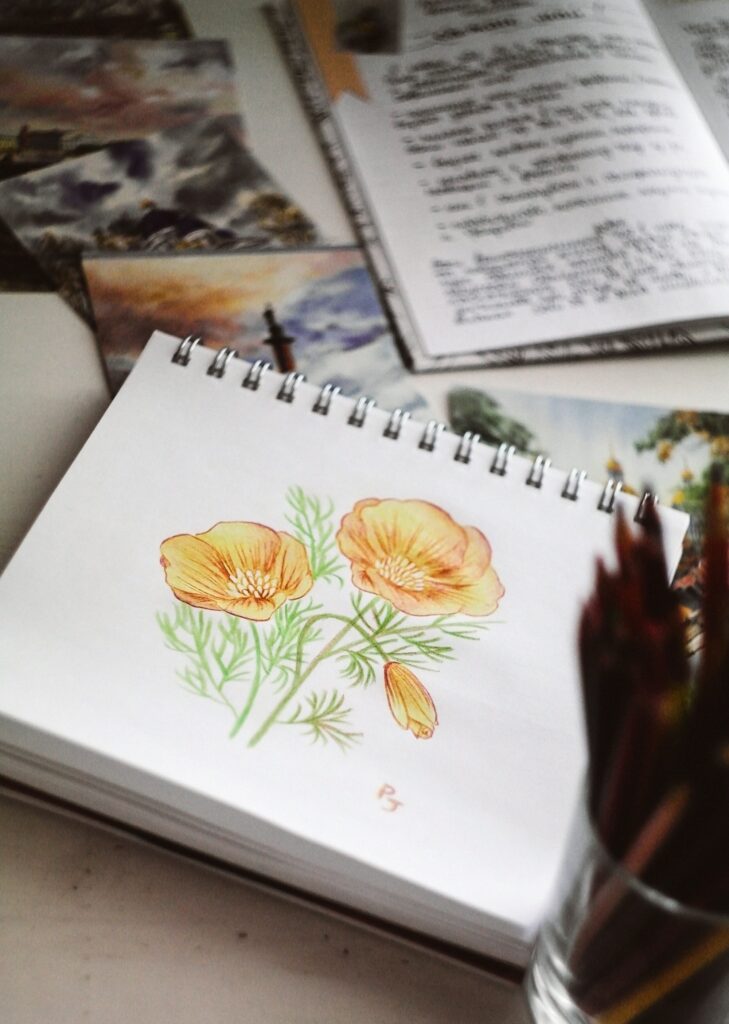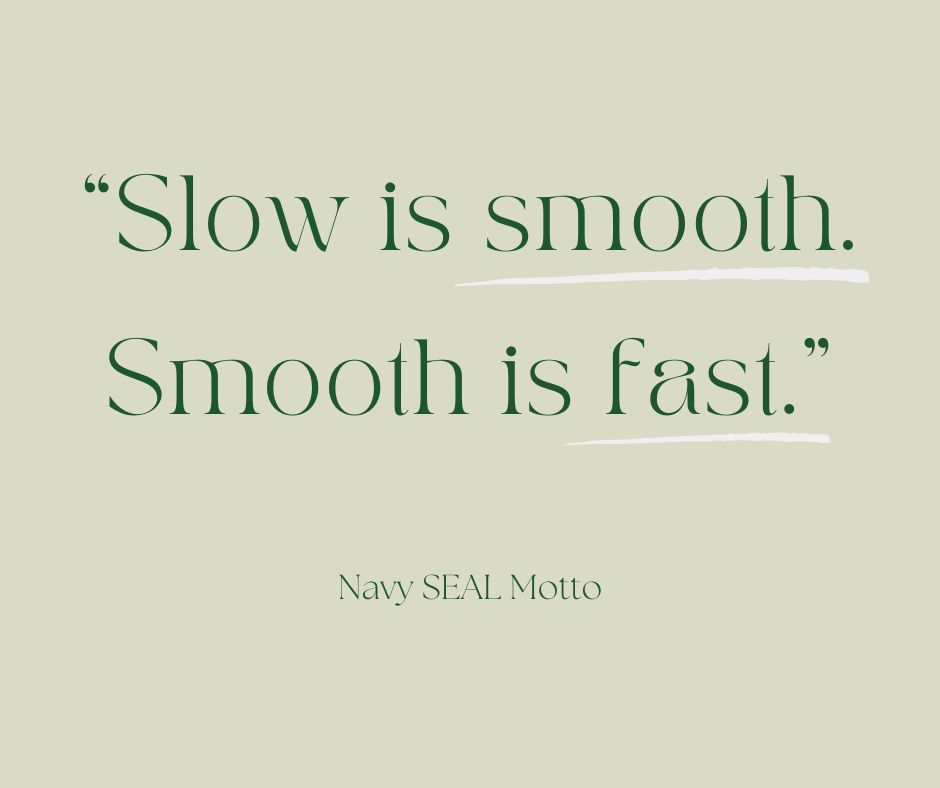I like my office job. I work with good people and contribute valuable skills to our team. Even on tough days, I’m still glad that my job gives me the financial freedom to live my life.
I knew something was wrong when I suddenly couldn’t stand my work.
My job hadn’t changed. I wasn’t demoted or facing new management. But I felt zero desire to show up and give my all.
So if the job wasn’t to blame, what was?
After reflecting, I realized I missed having time for things I enjoyed. My days were characterized by rushed mornings, long days at work, and housework in the evenings. I felt resentful about my responsibilities and envious of people who had time for their hobbies.
Reading The Artist’s Way opened my mind to a new way of living: one where my passions were just as important as my career and home responsibilities.
Hobby time is just as essential as time on the clock. After months of lifestyle changes, I finally have time to devote to the things I love.
Here’s how I did it.

Part 1: Effective Time Management at Work
Our jobs account for over a third of our day. As such, they can deeply affect the time we spend off the clock. Your ability to make time for your hobbies starts at work.
Think of your energy as currency. You wake up with only a certain amount in the bank. There are ways to artificially regain it (with caffeine) and naturally regain it (through mindful breaks) throughout the day.
The key to time management is to become more conscious of how you spend your energy.
Consider the following:
- How much time do you spend on social media at work?
- Does your job leave you too drained to pursue your hobbies?
- Do you make good use of your talents at work?
- Are you focused at work or do you procrastinate?
Below I’ve listed four strategies that help with conserving and regaining energy throughout the day. The goal is to utilize your energy effectively in your career while saving some for your hobbies later.
1. Take intentional, productive breaks
It’s easy to spend breaks scrolling through social media, momentarily forgetting about the inbox you need to clear.
Imagine if instead, you watched a quick video on one of your interests. Or if you jotted down a brief draft for you to continue after work. You would likely feel excited to pursue your hobby later and motivated to complete the task at hand.
Using breaks as a reward is another powerful motivator. If you want to watch another video on your hobby, aim at finishing a work project first. Tasks go quickly when there’s a light at the end of the tunnel.
Breaks are valuable opportunities to recharge during work. Choose to use that time wisely!
2. Train your focus
Our work habits follow us home. If we are disciplined at our jobs, we’ll be disciplined in our hobbies. If we’re distracted for most of the day, well…
Every hobby, no matter how enjoyable, has its challenging moments. Work ethic and problem-solving will carry you through. There’s no better place to grow these skills than at the office.
Doing so yields great benefits for your career. In a world of distractions, a focused, productive employee is hard to come by. But your career doesn’t need to be the sole reason you choose to be focused.
When I noticed my discipline at work was fading, I knew I needed to make a change for my own good. I wasn’t developing focus just for my employers, but for myself. As a result, my hobbies improved just as much as my job did.
If you’re unsure how to start regaining focus, below are good ways to start:
- Listen to music without vocals like classical or lo-fi
- Put your phone where you can’t see it
- Set a timer to focus for an hour
- Take a break when the timer goes off
- Write down distracting thoughts in a notes app
- Use a browser extension to block distracting websites

3. Incorporate your passions into your job
Skills used in your hobbies can give you an advantage at work.
For example, I incorporate my love of writing into the detailed documents I create for my company. My partner, who enjoys strategy games, is one of the best problem-solvers at his job.
Utilizing your strengths at work creates fulfillment and renews your energy to pursue your hobbies later.
4. Consider getting your steps in while you work
Walking while I work has been an absolute game-changer for my focus and activity levels.
I recently purchased this walking pad to go under my desk. The light movement keeps my subconscious mind occupied while I quickly work through my tasks. The first time I used it, I cleared my inbox in half of the time it normally took me.
Now, I easily reach my daily activity goals in the 8 hours I spend at work. I walk for 30-60 minutes each morning and again in the afternoon.
Exercising while I’m at the office saves me from having to hit the gym after work. Once I’m home, I almost immediately start on my hobbies instead.
The UREVO walking pad is one of the best purchases I’ve made for my health and headspace. If you’re considering upgrading your desk setup, I can’t recommend it enough.

Part 2: Spending Quality Time on Your Hobbies
The workday is over. Hopefully, you have managed to renew your energy throughout the day and are ready to take on your hobbies.
The key to making your time fruitful is to seek quality over quantity. If a few focused hours a week are all you can manage, it can be enough. You may find the following strategies helpful.
1. Stick to a Schedule
If we don’t schedule our time, it will quickly fill up with things to do.
Your hobbies deserve a slot on your calendar. I’ve found success dedicating Tuesday evenings and Saturday afternoons to sewing. Even during the busiest weeks, I still find time to sew during one of those times.
Start with dedicating one day a week to your hobby. If your evenings are hectic, carve out time on a Sunday. If your weekends are full of social commitments, choose a weekday. You know your schedule better than anyone else. Pick a day that works best for you.
Treat this time as if it’s untouchable, and believe that it is! Taking time for yourself has a ripple effect on everything you do. Prioritize it as if your work and well-being depend on it because they very well do.
2. Focus on one project at a time
You know focus is important when I’ve mentioned it twice now. 😉
It’s just as crucial at home as it is in the office. And I speak from experience. I have avoided my sewing room too many times because of the unfinished projects scattered about.
Scatterbrained by nature, I find it to be a deeply meaningful experience to lose myself in a project from start to finish. I am astounded by how much more productive it is as well.
For optimal focus, choose a project that is both in your current skill level and exciting for you. There is a sweet spot right in between familiar and challenging. That is where you should aim.
If you are seasoned in your craft, you’ll likely know what projects lie in this sweet spot for you. If you are a complete beginner, I recommend searching for beginner guides to help you get started.

3. Take your time
Yes, I am suggesting you work slower on your hobbies to better time manage.
No, that is not a contradictory statement.
It’s incredibly easy to rush through a project and find yourself in an “aw s**t” moment that takes hours to reverse. When you’re spending your time going backward in your project, you lose precious momentum.
This is precisely what “Slow is smooth. Smooth is fast.” is getting at.
For example, I started sewing with the expectation that it would be fast. We’re talking whole outfits completed during a single afternoon. I owe this assumption to the incredibly talented but perhaps bad influence (she’d agree) Micarah Tewers on YouTube.
When I started watching her videos, I was mesmerized by the dresses she made and her self-assured creativity. What I didn’t realize was how many late nights went into each project and how much her 10 years of sewing experience came in handy.
Needless to say, my first rushed-through projects needed serious improvement.
Impatience is one of my faults and sewing has helped me reverse it. Every time I slow down, plan a project carefully, or better yet, make a muslin before chopping into my fabric, I never regret it.
Whichever hobby you choose, do it for the experience, not solely the end result. Take your time to avoid unnecessary errors. Appreciate the slow and steady process. It is equally as rewarding as the final product.
4. Have resources to aid in problem-solving
While slowing down prevents careless errors, it can’t prevent mistakes entirely. After all, how else would you learn?
Problem-solving is your greatest weapon against procrastination. Having resources to fall back on when you’re frustrated with your hobby can keep you going when you feel like throwing in the towel.
Resources can be found everywhere. Plenty of hobby YouTube channels have helpful advice and tutorials. Blogs are another great option. If nothing else, buy a few books to have on hand.
With hobbies, knowledge is power. When you couple knowledge with experience and problem-solving, you gain wisdom.

5. Become part of a community
It can be wonderfully uplifting to share experiences with people who enjoy the same hobbies as you.
Finding comradery in your hobbies may be as easy as finding a Facebook group. If you prefer in-person interaction, search for communities in your area.
Sharing your hobby with others creates accountability and support. When you’re faced with a challenge, people in your group can provide insight. Whatever you’re going through, someone else has likely gone through before.
Communities are a great way to find opportunities to do your hobby in group settings as well. You may find the change of pace keeps your interest up, which is valuable to have.
6. Don’t force it
Interest in hobbies comes in waves. It’s normal for creativity and inspiration to fade at times.
On such days, you may show up to your scheduled hobby time and not feel up to it at all. However, simply showing up is enough.
A few ways to enrich your hobbies while recovering from exhaustion are:
- Cleaning, organizing, or decorating your workspace
- Finding inspiration for your next project
- Reading a book about unlocking creativity like The Artist’s Way
- Journaling to clear your headspace
- Brain dumping ideas
- Learning a new skill to aid your hobby
- Revisiting unfinished projects
- Taking a break and trying another hobby
Forcing yourself to power through discouragement isn’t always the answer. If your hobby is starting to become unenjoyable, take a step back. As long as you enrich your mind with new techniques and ideas, the spark will always return.
Our careers and hobbies are connected in this way: You can accomplish amazing things with determination and discipline.
Take time for the things you enjoy as a means of self-respect. Have the courage to show up even when you don’t feel like it. Above all else, remember it’s never too late to start again.
Until next time, I wish you the very best in your hobbies!
O&K
Leave a Reply